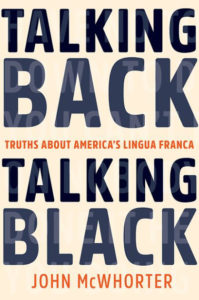 Is Ebonics a language? It was popularized as a distinct language spoken by some American African-Americans in the 1980’s and 90’s, yet another note in the culture war symphony.
Is Ebonics a language? It was popularized as a distinct language spoken by some American African-Americans in the 1980’s and 90’s, yet another note in the culture war symphony.
It’s interesting, and ironically humorous that linguist John McWhorter refers to a ‘Lingua Franca’ in the title of his book, not a ‘language.’ ‘Lingua Franca’ means literally, ‘French Language’ and connotes any universally understood tongue – as French virtually was in Europe in the years around World War I. That irony captures the light and sometimes humorous tone McWhorter takes toward the subject of African-American, or black speech in America.
He studies “black speech” in this book, he says, because that carries a specific ethnographic meaning. White, Afrikaans-speaking citizens, for example, who immigrated from South Africa, are also “African-Americans,” but we don’t call them that. He’s interested in what’s called “African-American Vernacular,” Sometimes he calls it black dialect. He avoids the term, ‘language’.
“Ain’t nobodycan diss my ride, you fill me?” I can understand that sentence but intelligibility is not the only criterion for defining a distinct language according to ISO Standard 639-3. Just as important is for communicators to have a “common literature or a common ethnolinguistic identity,” which nearly all Americans do, in whole or part. But conversely, having “distinct ethnolinguistic identities can be a strong indicator that [the groups’ speech] should nevertheless be considered to be different languages.” On that criterion, one could argue that there is indeed a distinct black language. It’s a difficult definition.
McWhorter’s main point is that whether characteristically black American speech is considered a language, dialect, or vernacular, it is a distinct and legitimate form of speech and above all NOT a devolution of “standard” American English, which hardly anybody speaks anyway. He labors to make this point: Black speech is in no way inferior to Standard English. He brings forth plentiful historical and linguistic evidence for this point and even points out how black speech is in some ways more rich in expression than Standard English.
That’s exactly the thesis that makes this book and McWhorter’s point of view controversial. Even educated black people, he says, even his close friends, do not admit that there is a distinctly black way of speaking, even though it is patently obvious that there is. Why? Because black speech patterns are considered, by educated, “proper” society to be vulgar, inferior, low-class, uneducated and degenerate. And why that judgment? Racism, pure and simple.
Most educated black people don’t even like to admit there is a black accent, or “blaccent,” as McWhorter names it, though a simple test is to listen to a television program with your eyes closed and pick out the black voices then look to confirm. Anyone can do this. But again, to admit that black people have a blaccent is to implicitly make a judgment that black speech, and therefore black people, are inferior to the (white) standard.
McWhorter’s mission is to overcome these racial biases with reason and evidence. Black accent, vocabulary, and grammar, are not a matter of slang, not merely a Southern dialect, and not a product of ignorance. Black speech has legitimate historical roots and is organic to an ethnicity, and should be taken as a legitimate vernacular of its own.
Besides all that, code-switching is common. Most black people can speak Standard English perfectly well if circumstances call for it (very funny examples are often found in the work of Eddie Murphy, Chris Rock, Dave Chappelle and many others). Just as interesting, many black speakers, like McWhorter (I’ve heard many recorded lectures by him) have no discernible blaccent yet can speak black vernacular at will. Barack Obama was once criticized for doing exactly that.
I was fascinated by the historical and linguistic evidence, for example, from early 19th century recordings of black speech that McWhorter describes as sounding like Irish or Scottish, nothing like today’s vernacular. Language, any language, is alive, always changing, never static.
I’m a huge McWhorter fan. It was only from him that I came to understand proto-Indo-European, and much else. Since I was already on board with him concerning the uniqueness and legitimacy of black speech, it’s hard for me to evaluate how convincing his arguments are. I was convinced, but racism is not an evidence-based attitude so I don’t think he’ll change any minds on that front. But he might give pause for thought among those willing to listen, because the topic of black vernacular is widely misunderstood. I admire him for the effort.
McWhorter, John (2017).Talking Back, Talking Black: Truths About America’s Lingua Franca. New York: Bellevue Literary Press, 191 pp.
